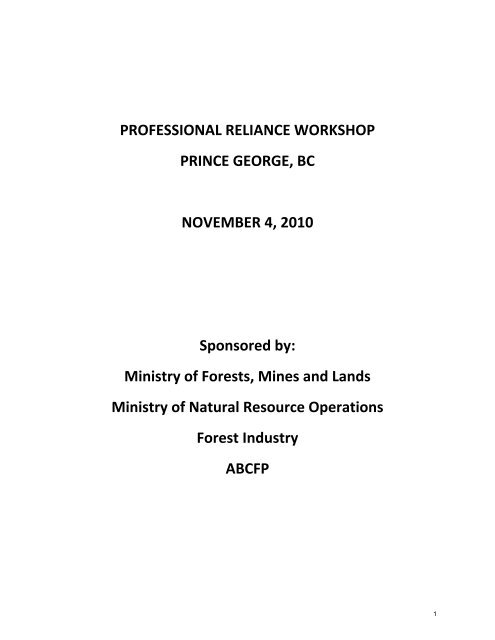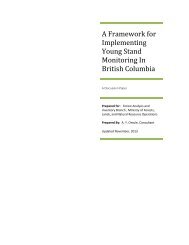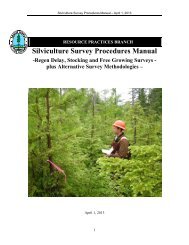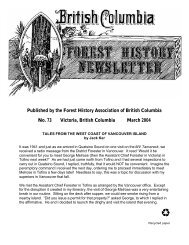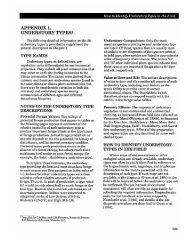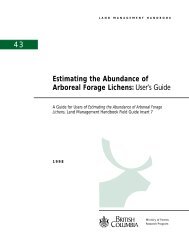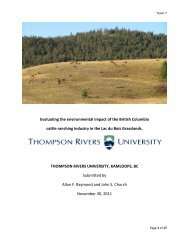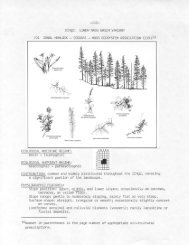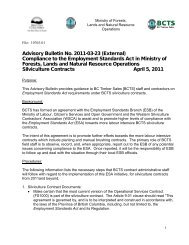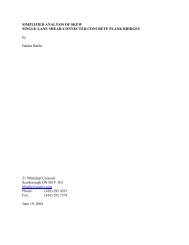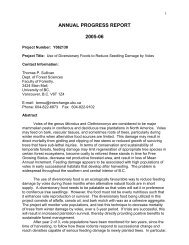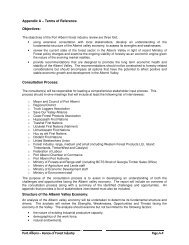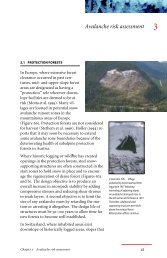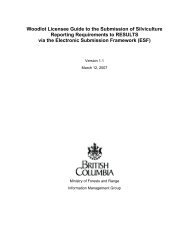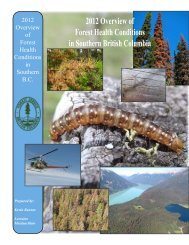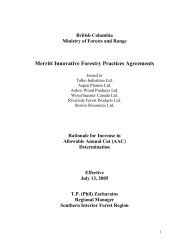November 4th, 2010 - Prince George, Agenda ... - Ministry of Forests
November 4th, 2010 - Prince George, Agenda ... - Ministry of Forests
November 4th, 2010 - Prince George, Agenda ... - Ministry of Forests
Create successful ePaper yourself
Turn your PDF publications into a flip-book with our unique Google optimized e-Paper software.
PROFESSIONAL RELIANCE WORKSHOP<br />
PRINCE GEORGE, BC<br />
NOVEMBER 4, <strong>2010</strong><br />
Sponsored by:<br />
<strong>Ministry</strong> <strong>of</strong> <strong>Forests</strong>, Mines and Lands<br />
<strong>Ministry</strong> <strong>of</strong> Natural Resource Operations<br />
Forest Industry<br />
ABCFP<br />
1
7:30 am - 4:00 pm<br />
<strong>November</strong> 4, <strong>2010</strong><br />
Cranbrook Room<br />
Ramada Inn<br />
444 <strong>George</strong> St, <strong>Prince</strong> <strong>George</strong><br />
250- 563-0055<br />
Objectives:<br />
1. Increase understanding <strong>of</strong> pr<strong>of</strong>essional reliance in the RNI.<br />
2. Foster trust and good working relationships amongst pr<strong>of</strong>essionals in the RNI.<br />
3. Move pr<strong>of</strong>essional Reliance forward in the RNI.<br />
Intended audience:<br />
• Champions for moving pr<strong>of</strong>essional reliance forward in RNI.<br />
7:30 am - 8:00am C<strong>of</strong>fee available<br />
8:00 am - 8:15 am Introductions/Welcome<br />
Greg Rawling - A/Regional Executive Director, RNI<br />
Larry Gardner - Chief Forester, West Fraser Mills<br />
8:15 am - 8:20 am Message from Hon. Pat Bell<br />
Minister <strong>of</strong> <strong>Forests</strong>, Mines and Lands (MFML)<br />
8:20 am - 9:00 am Moving Pr<strong>of</strong>essional Reliance Forward<br />
Jim Snetsinger - Chief Forester, MFML<br />
Tom Lewis - Regional Manager, Canfor<br />
Sharon Glover – Executive Director, ABCFP<br />
9:00am - 9:15 am Participant Expectations<br />
9:15 am - 9:45 am Pr<strong>of</strong>essional Reliance Survey Results<br />
Brian Barber - MFML Victoria<br />
Archie MacDonald - COFI<br />
9:45 am - 9:50 am Introduction to Afternoon Breakout sessions<br />
9:50 am - 10:30 am C<strong>of</strong>fee and Networking<br />
10:30 am - 11:00 am ABCFP’s Role in Pr<strong>of</strong>essional Reliance<br />
Mike Larock<br />
11:00 am - 11:30 am Empowering Trust<br />
Dave Francis – District Manger, Mackenzie<br />
Carl Vandermark – Canfor, Houston<br />
3
RNI Pr<strong>of</strong>essional Reliance Workshop<br />
11:30 am - Noon RNI Pr<strong>of</strong>essional Reliance Pilots – updates<br />
Mackenzie Pilot<br />
Steve Rooke – Mackenzie District<br />
Al Anderson – Canfor<br />
Kalum Pilot<br />
Barry Dobbin – District Manager, Kalum<br />
Noon - 1:00 pm Light Lunch – included in registration<br />
1:00 pm - 1:15 pm Introduction to Breakout session<br />
1:15pm- 2:45 pm Breakout Sessions<br />
Group discussions on selected themes/topics<br />
2:45 pm–3:30 pm Working C<strong>of</strong>fee Sessions-<br />
Advancing Pr<strong>of</strong>essional Reliance<br />
Checking if workshop expectations met<br />
Workshop evaluations<br />
3:30 pm–3:45 pm Wrap-up/Next Steps/Actions<br />
Greg Rawling/Larry Gardner<br />
Organizing Committee and acknowledgements:<br />
Organizing Committee:<br />
Wayne Martin<br />
John McLary<br />
Denise Michaud<br />
Brian Barber<br />
Diane Douglas<br />
Ray Crampton<br />
Larry Gardner<br />
Archie MacDonald<br />
Dave Bryden<br />
Mike Larock<br />
Facilitators:<br />
Greg Jonuk<br />
Kelly Cook<br />
Cathy Middleton<br />
Lauri Deveau<br />
Judy Thomas<br />
Andrew Wheatley<br />
Rob Norwell<br />
Beryl Nesbit<br />
John McClary<br />
Brian Oke<br />
4
Moving Pr<strong>of</strong>essional Reliance Forward<br />
Chief Forester, Forest Resource Stewardship Division, <strong>Ministry</strong> <strong>of</strong> <strong>Forests</strong>, Mines and Lands<br />
Jim Snetsinger<br />
On <strong>November</strong> 8, 2004, Jim was appointed to the position <strong>of</strong> Chief Forester, Forest Resource Stewardship Division. In this position, his<br />
main duties include: allowable annual cut determinations; setting forest stewardship policy; establishing standards for practices; and<br />
providing leadership to the Forest Resource Stewardship Division.<br />
After graduating from the University <strong>of</strong> Toronto in 1979, with a BSc in Forestry, Jim came to British Columbia in the fall and started his<br />
career with a forestry consulting firm in <strong>Prince</strong> <strong>George</strong>. He then went to work with BC Hydro as a forester for approximately five years<br />
before joining the British Columbia Forest Service in 1986.<br />
Jim has worked in various positions in the ministry, including appraisal <strong>of</strong>ficer, regional recreation <strong>of</strong>ficer, operations manager in the old<br />
Morice Forest District, regional staff manager, regional manager and regional executive director for the Northern Interior Forest Region.<br />
He also served as the regional director for Land and Water BC for a short period in 2002.<br />
While in Smithers, Jim spent 10 years as an active member <strong>of</strong> the Smithers Minor Hockey Association. He and his wife Joanne have<br />
two children, a son who is a graduate forester and a daughter in university. He loves most sports, but favours golf and tennis.<br />
Welcome and intros<br />
Good morning everyone and welcome to <strong>Prince</strong> <strong>George</strong>. It’s my pleasure to be with you here to today to discuss how we can<br />
collectively advance pr<strong>of</strong>essional reliance in BC.<br />
I’d like to provide you with some background and context for this initiative; what we mean by advancing PR; as well as the vision,<br />
desired outcomes, approach, and leadership <strong>of</strong> this initiative. I hope to cover these quickly so we can also hear perspectives from<br />
industry by Tom Lewis and Sharron Glover <strong>of</strong> the ABCFP, and to afford you some opportunity to ask us some questions.<br />
As Minister Bell stated in the video, we’ve been working under a PR model since the FRPA was introduced in 2004. But as you all<br />
know, we’ve all be relying on the advice and work <strong>of</strong> pr<strong>of</strong>essionals for decades.<br />
Nonetheless, we still have a ways to go in trusting and accepting the work <strong>of</strong> forest pr<strong>of</strong>essionals in BC, irrespective <strong>of</strong> their employer.<br />
Background and Context<br />
This initiative emerged through the MFR’s business response in January <strong>2010</strong>. It is one <strong>of</strong> several initiatives that seek to enhance the<br />
effectiveness, innovation and competitiveness <strong>of</strong> BC’s natural resource sector.<br />
Advancing Pr<strong>of</strong>essional Reliance still remains a key initiative <strong>of</strong> government regardless <strong>of</strong> the recent restructuring <strong>of</strong> the natural<br />
resource sector ministries.<br />
The Coast Forest Region began tackling PR last year, undertaking pr<strong>of</strong>essional reliance workshops and forming leadership teams in<br />
each district. The ABCFP have also taken steps in improve the understanding <strong>of</strong> RP and accountability processes for its members.<br />
This provincial PR initiative, and these interior workshops, therefore build on work started by the others over the past few year.<br />
What is advancing pr<strong>of</strong>essional reliance?<br />
Pr<strong>of</strong>essional reliance, as defined by the ABCFP, means accepting and relying upon the decisions and advice <strong>of</strong> pr<strong>of</strong>essionals who, in<br />
turn, can be held accountable for those decisions and advice.<br />
5
Advancing Pr<strong>of</strong>essional reliance is not about abrogating all land management and stewardship responsibilities to pr<strong>of</strong>essionals.<br />
Licensees and government are ultimately accountable for forest management in BC.<br />
Both licensees and gov’t need to trust and rely upon the work <strong>of</strong> pr<strong>of</strong>essionals; and they can and do exercise management prerogative<br />
when considering pr<strong>of</strong>essional advice. Licensees, government and pr<strong>of</strong>essionals must therefore work together in a “pr<strong>of</strong>essional<br />
reliance system”. We want to improve and advance this system.<br />
Vision and Outcomes<br />
Our vision is, by 2012, that government, licensees and the public understand, accept and can confidently rely on a pr<strong>of</strong>essional reliance<br />
system that ensures sound stewardship <strong>of</strong> the province’s natural resources.<br />
By achieving this vision, we expect to realize the following outcomes:<br />
• a culture <strong>of</strong> mutual respect and trust between govt and industry – and between pr<strong>of</strong>essionals;<br />
• a shared, common understanding <strong>of</strong> pr<strong>of</strong>essional reliance;<br />
• clear accountabilities – <strong>of</strong> government, licensees & pr<strong>of</strong>essionals;<br />
• an environment that supports innovative practices;<br />
• more effective application and use <strong>of</strong> risk management;<br />
• more efficient processes; and, as a result,<br />
• reduced transaction costs and efficient use <strong>of</strong> limited resources,<br />
Collectively these will serve to increase the competitiveness <strong>of</strong> BC’s resource sectors without compromising the health and productivity<br />
<strong>of</strong> forest and range lands;<br />
Judging from the responses to the survey, not everyone shares these views. This in itself represents one <strong>of</strong> our biggest challenges.<br />
Approach<br />
We are using a 3-pronged approach to achieve this vision and outcomes:<br />
1. Raise awareness and understanding <strong>of</strong> PR across govt and industry<br />
2. Identify operational and administrative barriers and opportunities to PR within our current policy framework;<br />
and, later on, if necessary...<br />
3. Make legislative changes to strengthen the PR model.<br />
The scope <strong>of</strong> this 3-pronged approach is initially to be focused on forest practices. Trying to tackle PR across all agencies and<br />
pr<strong>of</strong>essions at the same time is not practicable.<br />
Over time we will broaden this initiative to include other agencies and pr<strong>of</strong>essionals. This has already begun. MOE has expressed<br />
interest in participating the steering committee, participates on the PR working group, and several MoE staff and non-forestry<br />
pr<strong>of</strong>essionals are here with us today.<br />
Leadership<br />
As Minister Bell stated, advancing PR requires a collaborative effort between govt, industry, the association and consultants. A steering<br />
committee consisting <strong>of</strong> senior managers from MFR, Industry and the ABCFP, chaired by Sharon Glover, is charged with setting and<br />
overseeing direction.<br />
Brian Barber and Brian Westgate also lead a cross agency PFIT pr<strong>of</strong>essional reliance working group. The steering committee has<br />
asked tasked this group with developing a work plan for raising awareness & understanding, and exploring barriers and opportunities to<br />
advancing pr<strong>of</strong>essional reliance. For the latter, they draw ideas and examples from the survey, and from team members representing<br />
various business areas.<br />
This provincial oversight does not preclude, nor has it to-date, regional Operational Issues Forums and other groups from discussing<br />
PR issues and seeking solutions independently. The advantage <strong>of</strong> vetting successful ideas through the PR working group, is that those<br />
ideas can subsequently be shared and implemented across the province.<br />
As participants in this workshop, you can also serve to advance PR by leading and championing change in your respective <strong>of</strong>fices –<br />
where they be government districts, industry divisions, community tenure <strong>of</strong>fices and consulting firms<br />
As Executive Sponsor for PR within the <strong>Ministry</strong> <strong>of</strong> <strong>Forests</strong>, Mines and Lands, I will continue to champion change within our<br />
organization. Policies will be reviews with a pr<strong>of</strong>essional reliance lens. My staff will also continue to work closely with our colleagues in<br />
the new <strong>Ministry</strong> <strong>of</strong> Natural Resource Operations, to ensure that PR will be implemented successfully on the front-lines.<br />
6
Summary<br />
I could go on, but we have lots <strong>of</strong> work to do, and I don’t want to steel Tom and Sharon’s time and thunder. In summary...<br />
• PR is a top priority <strong>of</strong> the Nat Resource Sector Ministries<br />
• Success depends on govt, industry and pr<strong>of</strong>essionals working together to achieve the vision and desired outcomes<br />
• This begins with establishing trust, mutual respect and a shared understanding between govt and industry, and between<br />
resource pr<strong>of</strong>essionals.<br />
• You can be the leaders <strong>of</strong> this change.<br />
BC is already a world leader in sustainable forest management. Let’s take it to the next level, and create a system where pr<strong>of</strong>essionals<br />
are trusted, valued, able to innovate and take risks, while protecting the environment and improving our economy.<br />
All the best in your deliberations today.<br />
I look forward to working with you in advancing pr<strong>of</strong>essional reliance in BC.<br />
NOTES:<br />
7
Thomas Lewis RPF<br />
Regional Manager – Canfor<br />
• Grew up on Vancouver Island<br />
• Worked in the logging industry on the coast in the 70’s<br />
• Graduated from Selkirk College in 1983 and then later went through the pupil program<br />
• Became an RPF in 1995 at the young age <strong>of</strong> 37<br />
• Have lived in <strong>Prince</strong> <strong>George</strong> for the past 18-years<br />
• Married to Mary Clare with two daughters (Tessa -17 and Alex-20)<br />
• Have worked for Canfor for the past 12-years in Woodlands, Human Resources and Manufacturing<br />
• Currently Regional Manager for Canfor’s Forest Management Group (responsible for all woodlands operations and log<br />
deliveries in BC and Alberta – approx 12 million m3 at current run rates)<br />
• Passion in life is traveling to exotic countries with my family<br />
Speaking notes:<br />
• Thank you for the invitation, appreciate the opportunity to address this group on the topic <strong>of</strong> pr<strong>of</strong>essional reliance today.<br />
• My comments will come from the perspectives <strong>of</strong> both my experience as a manager in the forest industry, as an operational<br />
forester, and as someone who has been involved in the discipline process with ABCFP for the last 15-years.<br />
Industry perspective on the checks and balances in play today:<br />
• Existing legal requirements are comprehensive (FRPA, FA, Foresters Act, Regulations, many others)<br />
• Internal (at Canfor)<br />
o Our own Forest Stewardship Plan & Sustainable Forest Management Plan<br />
o Internal inspection <strong>of</strong> both our plans and practices<br />
o Internal review <strong>of</strong> our results through SQCDE and our Environmental Management System – both systems include a<br />
root cause, corrective action and continuous improvement component<br />
o Formal Internal audit process <strong>of</strong> both plans and practices – includes a self reporting, root cause, corrective action<br />
and continuous improvement component<br />
o Formal External Audit <strong>of</strong> both plans and practices (3 rd party certification audits) – includes a self reporting, root<br />
cause, corrective action and continuous improvement component<br />
• External<br />
o Compliance & Enforcement on practices<br />
o Forest Practices Board Audits & Special Investigations<br />
o ABCFP complaint and discipline process<br />
When I consider the level <strong>of</strong> regulation as well as internal and external oversight, it leads me to question the need for an approval<br />
process (or what that could look like) and whether we are making the best use <strong>of</strong> our resources.<br />
The Doctor example: diagnosis, tests, expert opinion leads to a prescription. What if the Doctors prescription needed to go to an agency<br />
for approval?<br />
In a pr<strong>of</strong>essional reliance world, what are some <strong>of</strong> the weaknesses that need to be overcome?<br />
• As an association <strong>of</strong> pr<strong>of</strong>essionals, we may need to strengthen our pr<strong>of</strong>essional competence requirements:<br />
o Ensure adequate knowledge – adapting to changes in science<br />
o More comprehensive practice review process (comment on my experience)<br />
o General understanding <strong>of</strong> due diligence (comment on recent discipline cases)<br />
• Resources <strong>of</strong> the ABCFP will need to be adequate to the task<br />
• The MOF structure and process will need to align with the initiative (may have happened last week)<br />
• We will need to apply the principles consistently across the province.<br />
• If the approval process goes away, will need a process to audit things that can not be audited after the fact (cruising, ECE)<br />
How do we gain trust in this new world? (Outcome <strong>of</strong> the survey would indicate we don’t have it)<br />
• This will take time – trust must be earned<br />
• Foresters need to be given the opportunity to gain that trust<br />
• Process will need to be managed with the appropriate level <strong>of</strong> risk<br />
o Set the standard (it’s already in place)<br />
o Measure the outcome (be transparent)<br />
o Take appropriate action as required<br />
o Improve our process over time (Basic Performance Management Model)<br />
Use new employee in a key role example:<br />
• A prudent manager doesn’t send a new employee <strong>of</strong>f into a key role and hope it will all work out<br />
• Requires setting expectations, performance monitoring, coaching and corrective actions<br />
• Also requires some latitude and trust based on results<br />
8
• More freedom over time as you gain trust<br />
How do we need to change to make this all work?<br />
As foresters<br />
• ensure we understand and practice an appropriate level <strong>of</strong> due diligence<br />
• ensure we are knowledgeable in our area <strong>of</strong> practice<br />
As industry employers and managers<br />
• ensure adequate checks and balances are in place (relative to the risk)<br />
• ensure our foresters have sufficient training, time and resources to effectively and efficiently manage the resource<br />
Thank you for this opportunity<br />
NOTES:<br />
9
Chief Executive Officer ABCFP<br />
Sharon Glover joined the ABCFP in early 2007. In her role as chief executive <strong>of</strong>ficer (CEO), Sharon is accountable to council for<br />
ensuring the association fulfills its mandate under the Foresters Act and fulfills its strategic goals.<br />
One <strong>of</strong> Sharon's primary goals is to ensure that the government looks to the association and forest pr<strong>of</strong>essionals first when they are<br />
creating or changing forest policy.<br />
Sharon brings an extensive background in association management, advocacy, government relations and communications. Sharon<br />
came to the ABCFP from the Ontario Society <strong>of</strong> Pr<strong>of</strong>essional Engineers where she was the chief executive <strong>of</strong>ficer. Sharon has also<br />
owned and operated her own consulting company and held senior positions with provincial and national associations.<br />
She holds a BA (Hons.) from the University <strong>of</strong> Toronto in political science and economics, and an MBA (Finance) from Queen’s<br />
University.<br />
Speaking Notes:<br />
• Thank-you for inviting me and it’s a pleasure to be here<br />
• As you can tell from my introduction and as some or perhaps all <strong>of</strong> you know, I am probably one <strong>of</strong> the only ones in the room<br />
today who is not a forest pr<strong>of</strong>essional – and yet I believe passionately in your role as regulated pr<strong>of</strong>essionals; in your abilities<br />
as trusted and respected sources <strong>of</strong> information and in maximizing your service in pr<strong>of</strong>essional reliance.<br />
• So why is that and why does the phrase, pr<strong>of</strong>essional reliance matter so much to the association?<br />
• First <strong>of</strong> all, we, more than anyone else, are acutely aware <strong>of</strong> the educational and experience hurdles that you have to achieve<br />
before reaching the door <strong>of</strong> the association<br />
• Then there is the mentoring process as an enrolled member, to ensure you’ve got some experience; finally there’s the grueling<br />
exam.<br />
• So we already know what our members are capable <strong>of</strong>. We already know that our members are competent<br />
• And we also understand that forestry is itself not an exact science. It’s understanding ecosystems and is at best a big grey<br />
area that requires a pr<strong>of</strong>essional’s expertise.<br />
• So having a system in place that is highly prescriptive and won’t let you use the education and experience, just doesn’t make<br />
sense to us. Conversely a system that rests on pr<strong>of</strong>essional knowledge and skill has a better chance <strong>of</strong> enjoying the benefits<br />
<strong>of</strong> pr<strong>of</strong>essional service.<br />
• We want you to be able to rely on each others pr<strong>of</strong>essional work;<br />
• We want you to be innovative and try things on the ground that make sense to you in a particular circumstance.<br />
• And as an added bonus – it’s just a way more efficient and effective system.<br />
• The question we have is how do we make it work better. And that’s why we’re here with you today<br />
• I think if there were two areas that I could pick out that need work I’d ask you to think about these two issues:<br />
o Trust; and<br />
o Knowing and understanding your pr<strong>of</strong>essional role<br />
• In terms <strong>of</strong> trust – it’s important to recognize that while some <strong>of</strong> you may work for government and others for industry or<br />
consultants – you all belong to the association and by being a member you all have undertaken to practice only in areas where<br />
you are competent.<br />
• So if you look across the room you should reassure yourself that those around you are as competent as you are --- and<br />
perhaps you should trust them more then you do now.<br />
• Secondly – it’s also all about knowing your pr<strong>of</strong>essional role. And Mike Larock will get into this later when he makes his<br />
presentation. But we know that some <strong>of</strong> the confusion around pr<strong>of</strong>essional reliance comes from people not knowing their role<br />
– and perhaps taking on roles that they shouldn’t.<br />
• In our world there are some very clear laws around managing the forest and who is legally responsible for certain decisions.<br />
And it’s imperative that everyone has a good understanding <strong>of</strong> what those laws say – and by those laws I am including FRPA ,<br />
the Forest Act and the Foresters Act.<br />
10
• . As a regulator <strong>of</strong> pr<strong>of</strong>essionals there has always been some aspect <strong>of</strong> forest legislation that has relied on the advice and<br />
judgement <strong>of</strong> the forest pr<strong>of</strong>essional. And for the last 14 years we have put a lot <strong>of</strong> time and effort into pr<strong>of</strong>essional reliance,<br />
first in the Forest Practices Code and now FRPA.<br />
• With the fee increase, members agreed with us that more <strong>of</strong> the associations resources should be spent on pr<strong>of</strong>essional<br />
reliance. So in the next year or so we will be able to put even more effort into pr<strong>of</strong>essional reliance to assist pr<strong>of</strong>essionals in<br />
the field<br />
• There is much to be done to get to where we all need to be in pr<strong>of</strong>essional reliance. So I thank-you for coming and for<br />
participating in the workshop today.<br />
• It’s important and I’m glad you’re here to see what you can do to improve pr<strong>of</strong>essional reliance for us all.<br />
NOTES:<br />
11
Pr<strong>of</strong>essional Reliance<br />
Survey Results<br />
Brian Barber, RPF<br />
<strong>Ministry</strong> <strong>of</strong> <strong>Forests</strong>, Mines and Lands, Victoria<br />
and<br />
Archie MacDonald, RPF<br />
Council <strong>of</strong> Forest Industries, Kelowna<br />
Overview<br />
� Purpose<br />
� Background<br />
Pr<strong>of</strong>essional Reliance Workshop<br />
<strong>Prince</strong> <strong>George</strong><br />
<strong>November</strong> 4, <strong>2010</strong><br />
� Survey Contents<br />
� S Survey RRespondents d<br />
� Responses and key findings<br />
� Summary and Conclusions<br />
� Next steps<br />
� Acknowledgements<br />
Purpose <strong>of</strong> Survey<br />
� Support Advancing Pr<strong>of</strong>essional Reliance<br />
� Assess current understanding and<br />
application <strong>of</strong> PR<br />
�� Identify barriers and opportunities to PR<br />
� Guide development <strong>of</strong> workshops<br />
� Provide a baseline for measuring success<br />
1<br />
2<br />
3<br />
12
Background<br />
� Initiated by RSI Operational Issues<br />
Forum (OIF) team<br />
� Collaborative effort by MFR, Industry,<br />
ABCFP – Endorsed by Exec.<br />
� TTool: l SSurveyMonkey M k<br />
� Invitations to MFR staff,<br />
ABCFP & others<br />
� Open Sept. 7 to 26, <strong>2010</strong><br />
� Anonymous entries<br />
Survey Contents<br />
Seven Sections: 127 statements + comments<br />
1. Respondent Information<br />
2. Understanding <strong>of</strong> PR<br />
3. Application <strong>of</strong> PR<br />
44. ABCFP<br />
5. Personal Pr<strong>of</strong>essional Practice<br />
6. Plans and Submissions<br />
7. Training and general comments<br />
Answers were assigned a score based on<br />
agreement or frequency<br />
Survey Respondents<br />
1425 responses<br />
RSI RNI RCO Victoria<br />
49% 34% 31% 10%<br />
BC Govt Licensees Consultants Other<br />
55% 24% 18% 3%<br />
RPF RFT FIT PEng PAg RPBio<br />
Others<br />
63% 30% 3% 10%<br />
4<br />
5<br />
6<br />
13
Analysing Survey Results<br />
Responses and Key Findings<br />
S. 2 – Understanding PR<br />
� Personal Understanding <strong>of</strong> PR - High<br />
� PR is a Shared Responsibility - High<br />
� Desired outcomes <strong>of</strong> PR – Variable<br />
◦ Id Industry – Hi High h<br />
◦ Consultants – Mid<br />
◦ Government – Low<br />
� Application <strong>of</strong> Risk<br />
� Stewardship<br />
� Public confidence and trust<br />
Responses and Key Findings<br />
S. 3 – Application <strong>of</strong> PR<br />
� Low scores but consistent by employer<br />
� Trust and working relationships – Low<br />
� Competence by employer group – High<br />
bbut t biased to t one’s ne’s employer em l er group r<br />
� Application <strong>of</strong> PR to business areas<br />
◦ Engineering – High<br />
◦ Stewardship - Mid<br />
◦ Cruise and Appraisals – Low<br />
◦ Monitoring - Low<br />
7<br />
8<br />
9<br />
14
Responses and Key Findings<br />
S. 4 – Assoc <strong>of</strong> BC Forest Pr<strong>of</strong>essionals<br />
� Standards for Accepting Members - High<br />
� Accessible information – High<br />
� Standards and Guidance - Mid<br />
� Assessing Member Competence - Low<br />
� Disciplinary process – significant variance<br />
amongst employer groups<br />
Industry high – Gov’t low<br />
Responses and Key Findings<br />
S. 5 – Personal Pr<strong>of</strong>essional Practice<br />
� Overall – High but contrasts with<br />
scores in Application <strong>of</strong> PR<br />
� Areas for improvement:<br />
◦ Peer review review,<br />
◦ Document pr<strong>of</strong>essional<br />
development and decisions<br />
◦ Maintain currency in practice<br />
◦ Bring unresolved issues to attention <strong>of</strong><br />
the ABCFP (disciplinary process)<br />
Responses and Key Findings<br />
S. 6 – Plans and Submissions<br />
Substantial differences by employer on quality:<br />
Licensee Consultant Government<br />
� Pressure by reviewer<br />
� Rationales<br />
�� Clear and understandable<br />
� Considered non-legal<br />
obligations, options, risks<br />
� Free <strong>of</strong> errors and omissions<br />
� Verifiable and measurable:<br />
� Field checks confirmed successful<br />
� Quality <strong>of</strong> pr<strong>of</strong>essional work<br />
10<br />
11<br />
12<br />
15
Responses and Key Findings<br />
Comments : Themes and Threads<br />
1900 Comments – many negative<br />
� Lack <strong>of</strong> Support for PR<br />
� Lack <strong>of</strong> Trust <strong>of</strong> Industry<br />
“Fox guarding the hen house”<br />
“I “Industry d manages to bottom-line” b li ”<br />
� Lack <strong>of</strong> understanding <strong>of</strong> ...<br />
◦ Legal requirements – roles,<br />
responsibilities and obligations<br />
◦ Current practices – managing to<br />
minimums<br />
� ABCFP – complaints & accountability<br />
Summary and Conclusions<br />
� Good response rate and interest in PR<br />
� Substantial range <strong>of</strong> views on PR -<br />
strong to limited understanding<br />
� Range <strong>of</strong> views between employer groups<br />
� Consistency between regions<br />
� To advance PR need to....<br />
◦ Substantially improve the overall understanding <strong>of</strong> PR:<br />
◦ Increase trust between industry/govt<br />
◦ Clarify roles and responsibilities within PR system<br />
◦ Improve understanding and application <strong>of</strong><br />
accountability processes (e.g. ABCFP, C&E)<br />
Next Steps<br />
• Complete analysis report<br />
• Use results to<br />
• inform Interior and HQ workshops<br />
• Identify fy barriers and ops p to PR<br />
• Build and PR workplan<br />
• Conduct another (shorter) survey Sept ‘11<br />
• Measure and celebrate success !<br />
13<br />
14<br />
15<br />
16
Acknowledgments<br />
The following people made significant contributions to the<br />
survey and assessing its results:<br />
Government Industry ABCFP<br />
Ray Crampton Archie MacDonald Mike Larock<br />
Wayne Martin Larry Gardner<br />
John McClary Otto Schulte<br />
Larry Hanlon<br />
Chuck Rowan<br />
Thomas Chen<br />
Brian Barber<br />
Survey Results<br />
http://www.for.gov.bc.ca/hth/timten/FRPA_implementation<br />
/Pr<strong>of</strong>essional_Reliance.htm<br />
16<br />
17<br />
17
Empowering Trust<br />
Dave Francis RPF<br />
Carl vanderMark RPF<br />
<strong>Agenda</strong><br />
� Definitions<br />
� The survey paradox<br />
� Where PR is working<br />
� Impediments to Advancing PR<br />
� Principles, Applying PR<br />
� Summary & Questions<br />
Definitions<br />
� Reliance: means the practice <strong>of</strong><br />
accepting and relying on the decisions<br />
and advice <strong>of</strong> pr<strong>of</strong>essionals who can be<br />
held accountable for the decisions they<br />
make and the advice they give.<br />
18
Definitions<br />
� Accountability: is acknowledgement and<br />
assumption <strong>of</strong> obligations under<br />
pr<strong>of</strong>essional legislation and<br />
accompanying bylaws, including the<br />
potential for investigation and discipline<br />
to be imposed by the pr<strong>of</strong>ession.<br />
Definitions<br />
� Trust:<br />
a : assured reliance on the character,<br />
ability ability, strength strength, or truth <strong>of</strong> someone<br />
or something<br />
b : firm belief in the reliability, truth, or<br />
ability <strong>of</strong> someone or something<br />
The Survey Paradox<br />
� Similar good results for Personal<br />
Pr<strong>of</strong>essional Practice, BUT:<br />
�� Trustineachother’s Trust in each other s competence?<br />
� Perception <strong>of</strong> Plan Processes?<br />
� Perception <strong>of</strong> the Value <strong>of</strong> Advancing PR<br />
19
Where PR is working<br />
� Carl: Chemical Brushing<br />
� Dave: Free Growing Declarations<br />
Impediments<br />
� Application <strong>of</strong> PR Guidelines<br />
� Plan clarity<br />
�� Communication<br />
� Rationales<br />
Principles <strong>of</strong> PR applied to FRPA<br />
� PR is compatible with the principles <strong>of</strong><br />
Administrative Law<br />
� Delivery <strong>of</strong> pr<strong>of</strong>essional obligations enables<br />
and promotes PR<br />
� FRPA requirements and Pr<strong>of</strong>essional<br />
Obligations are distinct<br />
� FRPA requirements and Pr<strong>of</strong>essional<br />
Obligations are compatible<br />
20
Principles <strong>of</strong> PR applied to FRPA<br />
� Pr<strong>of</strong>essionals must communicate legal<br />
requirements to their employers<br />
� Without consent, pr<strong>of</strong>essionals must not<br />
commit to more than is legally required<br />
� Advocacy duty exists where a pr<strong>of</strong>essional<br />
believes legal requirements are inadequate<br />
� Public expectations do not necessarily equal<br />
public interest<br />
Summary<br />
� Reliance and Accountability go hand in<br />
hand.<br />
�� Relied upon as truthful and able?<br />
� Reliance is working; the “wheels aren’t<br />
falling <strong>of</strong>f”.<br />
� There are challenges but let’s not miss<br />
the boat.<br />
Questions??<br />
21
Role <strong>of</strong> the ABCFP in<br />
Pr<strong>of</strong>essional Reliance<br />
NRI Workshop <strong>November</strong> 4, <strong>2010</strong><br />
Mike Larock RPF<br />
Director <strong>of</strong> Pr<strong>of</strong>essional Practice and Forest Stewardship<br />
Workshop Objectives<br />
1. Increase understanding <strong>of</strong><br />
pr<strong>of</strong>essional reliance in the RNI<br />
2. Foster trust and good working<br />
relationships amongst pr<strong>of</strong>essionals<br />
in the RNI.<br />
3. Move pr<strong>of</strong>essional Reliance forward in<br />
the RNI.<br />
Presentation Points<br />
• Update on what the ABCFP is doing<br />
in pr<strong>of</strong>essional reliance.<br />
• What is the ABCFP planning in<br />
support <strong>of</strong> pr<strong>of</strong>essional reliance?<br />
• What can pr<strong>of</strong>essional reliance look<br />
like in the future?<br />
22<br />
1
What the ABCFP is doing<br />
in pr<strong>of</strong>essional reliance.<br />
Improving understanding and direction<br />
• Standards, Guidance, Pr<strong>of</strong>essional Development<br />
Supporting the legal foundation<br />
• Raising awareness with employers, government<br />
Ensuring competence and conduct<br />
• BCFP; practice reviews; access to practice<br />
information<br />
Foresters Act (2003)<br />
Creates 1. the practice <strong>of</strong> pr<strong>of</strong>essional<br />
forestry<br />
2. the forest pr<strong>of</strong>essionals<br />
3. the ABCFP<br />
Charges the ABCFP with serving and<br />
protecting the public interest<br />
Practice <strong>of</strong> Pr<strong>of</strong>essional<br />
Forestry has four parts<br />
1. Verbs: advising, performing,<br />
directing services<br />
2. Scope and implications respecting<br />
forests<br />
3. Require the specialized education,<br />
knowledge and experience <strong>of</strong> a<br />
registered member<br />
4. Non inclusive list <strong>of</strong> examples<br />
5<br />
6<br />
23<br />
2
Forest and Range Practices Act<br />
Definition<br />
“forest practice” means a prescribed<br />
activity that is carried out by<br />
a) the government<br />
b) tenure holder<br />
Pr<strong>of</strong>essional Reliance<br />
“the the the practice <strong>of</strong> accepting accepting and relying relying upon<br />
the the decisions decisions and and advice advice advice <strong>of</strong> <strong>of</strong> pr<strong>of</strong>essionals<br />
pr<strong>of</strong>essionals<br />
who who accept accept accept responsibility responsibility and and can can be be held<br />
held<br />
accountable accountable for for the the decisions decisions they they make make<br />
make<br />
and and the the advice advice they they give. give.” give.<br />
(Guideline: (Guideline: Definition Definition <strong>of</strong><br />
<strong>of</strong><br />
Pr<strong>of</strong>essional Pr<strong>of</strong>essional Reliance. Reliance. September September 2004)<br />
2004)<br />
Pr<strong>of</strong>essional Reliance<br />
is Working<br />
Practice Reviews<br />
• Over 90% effective at delivering standards<br />
Pr<strong>of</strong>essional Reliance Survey<br />
• Results from practitioners<br />
Complaint process is functioning<br />
…..And will continue to improve.<br />
7<br />
8<br />
9<br />
24<br />
3
What is ABCFP planning in<br />
support <strong>of</strong> pr<strong>of</strong>essional reliance<br />
Practice Reviews<br />
• Measuring practice<br />
Improving pr<strong>of</strong>essional reliance<br />
• Learning cycle; Principles <strong>of</strong> Stewardship; PR<br />
other business areas<br />
Support PR framework and use<br />
• Forest Management Leadership Teams;<br />
Industry/<strong>Ministry</strong> initiatives<br />
Understanding Roles<br />
Teamwork approach to forestry<br />
Forest pr<strong>of</strong>essional responsibilities<br />
� Be competence and conduct in<br />
pr<strong>of</strong>essional work - product<br />
� Be an advocate for change<br />
compromise <strong>of</strong> good forest stewardship<br />
public interest<br />
Understanding Roles<br />
Teamwork approach to forestry<br />
Submitting pr<strong>of</strong>essional responsibilities<br />
� Owns pr<strong>of</strong>essional work - product<br />
� Ensure work meets law<br />
� Responsible to collect and assess the<br />
reasonableness <strong>of</strong> information<br />
� Use qualified people<br />
10<br />
11<br />
12<br />
25<br />
4
Understanding Roles<br />
Teamwork approach to forestry<br />
Reviewing pr<strong>of</strong>essional responsibilities<br />
� Own the strength <strong>of</strong> the review<br />
� Objective assessment (reasonableness)<br />
� Meets the legal tests <strong>of</strong> employer<br />
� Strengthen the pr<strong>of</strong>essional submission<br />
� Provide information and advice<br />
Understanding Roles<br />
Decision Maker<br />
� Guided by legal tests<br />
� Use available information to inform the<br />
decision<br />
� Evaluate, decide risk acceptability<br />
� Evaluate, decide balance point<br />
Tenure holder<br />
� Responsible to follow the law<br />
� Responsible with DDM for management<br />
prerogative<br />
24-Feb-10 14<br />
What can pr<strong>of</strong>essional reliance<br />
look like in the future<br />
Pr<strong>of</strong>essional support<br />
� ABCFP suite <strong>of</strong> practice assistance<br />
� Employer endorsement <strong>of</strong> pr<strong>of</strong>essional<br />
service<br />
Trust in pr<strong>of</strong>essional service<br />
� Confidence and Expectation<br />
� Continuum <strong>of</strong> practice (gaps, overlap)<br />
Pr<strong>of</strong>essional assurance<br />
� Competent, accountable<br />
24-Feb-10 15<br />
13<br />
26<br />
5
How can we get there?<br />
The onus is on the employers to<br />
understand the practice <strong>of</strong> pr<strong>of</strong>essional<br />
forestry and use pr<strong>of</strong>essional service.<br />
The onus is on the ABCFP to enforce<br />
competence and conduct; to confirm and<br />
report on good pr<strong>of</strong>essional work.<br />
The onus is on the pr<strong>of</strong>essional to<br />
undertake their practice consistent with<br />
the Foresters Act, ABCFP bylaws and<br />
other legislation.<br />
24-Feb-10 16<br />
330 - 321 Water Street<br />
Vancouver BC, V6B 1B8<br />
Ph: 604-687-8027<br />
Fax: 604-687-3264<br />
E-mail: info@abcfp.ca<br />
Website: www.abcfp.ca<br />
27<br />
6
Mackenzie Forest District Cutting Permit Pilot<br />
Steve Rooke<br />
Scope <strong>of</strong> the Pilot:<br />
Cutting Permit, Appraisal, Cruise data Submissions – including a piece on First Nations information<br />
sharing/consultation<br />
Purpose/Objectives <strong>of</strong> the Pilot:<br />
To streamline current process that shifts the submission responsibilities back to the Forest Pr<strong>of</strong>essional<br />
and MFR takes on more <strong>of</strong> a role in auditing to ensure the crowns interests are met. MFR will further<br />
shift to ensure FN consultation is adequate and on the end results <strong>of</strong> the CP process.<br />
Further enhance the use existing applications as a one window approach. (ECAS, FTA etc)<br />
Further encouragement for forest pr<strong>of</strong>essionals in understanding <strong>of</strong> the required manuals, legislation<br />
and the standards <strong>of</strong> pr<strong>of</strong>essional practice<br />
Utilize existing legislation to further support the pr<strong>of</strong>essional reliance concept<br />
Encourage Peer to Peer review.<br />
Participants:<br />
MFR and Industry staff<br />
Licensees: Conifex, Canfor, Mackenzie Fibre<br />
Timelines:<br />
Starting <strong>November</strong> 1<br />
Fully implement trial by January 1<br />
Continue until <strong>November</strong> 1, 2011<br />
Review progress monthly, report up to regional group<br />
Monitoring:<br />
Review monthly with group<br />
Track all submissions and audits<br />
Make recommendations for submission standards and audit process/findings<br />
Expected outcomes, deliverables:<br />
Submission standards (flow diagram)<br />
Audit process, standards (quality measures, audit flow process)<br />
Results <strong>of</strong> audits – Findings, Discussions, Improvements<br />
Recommendations to the RNI PR Steering Committee for implementation<br />
Completed to date:<br />
Submission standards developed (100%)<br />
Audit process, standards (app. 50%)<br />
28
RNI Pr<strong>of</strong>essional Reliance Pilot<br />
Kalum Pilot<br />
Barry Dobbin – District Manager, Kalum<br />
Issue<br />
Cutting Permit issuances and Forest Stewardship Plan approvals are, at times, stalled by submissions that lack<br />
clarity around First Nation information sharing processes and outcomes. District Managers then have to request<br />
additional information from licensees or First Nations, or repeat processes that already occurred as part <strong>of</strong> Crown<br />
Consultation. Delays in permit issuance and plan approvals can have negative repercussions, including financial<br />
impacts and time wasted due to the repetition <strong>of</strong> tasks.<br />
Purpose<br />
To streamline processing time in permit issuance and plan approval processes by identifying efficiencies that will<br />
provide the District Manager with a clear understanding <strong>of</strong> the issues related to First Nations information exchange<br />
and stakeholder input. Through an enhanced understanding and application <strong>of</strong> pr<strong>of</strong>essional reliance, the<br />
coordination <strong>of</strong> District staff, Industry representatives and Forest Pr<strong>of</strong>essionals will improve cost effectiveness and<br />
facilitate innovation in managing the Kalum and North Coast forest and range resources.<br />
Scope<br />
The initial scope <strong>of</strong> the pilot is applicable to Cutting Permit (CP) issuance and upcoming Forest Stewardship Plan<br />
(FSP) amendments. However, given that FSP amendments are relatively infrequent; most focus will be on CPs.<br />
Approach<br />
The Kalum Forest District Pilot Co-leads, in conjunction with the Kalum and North Coast TSA Steering Committees,<br />
will conduct joint expectation meetings to address the issues, define the available tools and determine relevant<br />
information that can be exchanged. Communications, submission timelines and meeting summaries will be<br />
monitored to provide the information required to develop best management practices. As a measure <strong>of</strong> progress, the<br />
best management practices will be reviewed periodically to facilitate improvements.<br />
Outcomes<br />
A summary <strong>of</strong> best management practices for First Nation information sharing will be developed and <strong>of</strong>fered for use<br />
to District proponents. The summary would outline which components <strong>of</strong> permit and plan submissions are best<br />
completed by respective District or Licensee staff and Forest Pr<strong>of</strong>essionals, and where opportunities may exist for<br />
peer processes between District and Licensee proponents. Submissions, developed with consideration to the best<br />
management practices, will then articulate the relevant concerns and issues necessary for District Manager review<br />
and issue or approve them more efficiently. Consideration will be given to structuring a template that embodies best<br />
management practices for permit or plan submission processes, with the understanding that such a template would<br />
have to be <strong>of</strong> use to both District and Licensee proponents.<br />
Expected benefits for stakeholders also include, but are not limited to:<br />
• Licensees- improved clarity around the application <strong>of</strong> pr<strong>of</strong>essional responsibilities; improved clarity around<br />
plan approval and permit issuance processes; improved timelines for approvals and issuances.<br />
• Crown- improved clarity around pr<strong>of</strong>essional responsibilities related to the review <strong>of</strong> plan and permit<br />
submissions; demonstrable evidence <strong>of</strong> an increase in the application <strong>of</strong> pr<strong>of</strong>essional reliance; reduced time<br />
spent on processing submissions; opportunity to apply results to other natural resource Ministries and<br />
Resource Management Coordination.<br />
• Pr<strong>of</strong>essionals- improved distinction between pr<strong>of</strong>essional responsibilities versus MFR and licensee<br />
responsibilities; opportunity for information exchange and pr<strong>of</strong>essional dialogue around localized results and<br />
strategies that will advance stewardship and encourage innovation.<br />
• First Nations – improved understanding and clarity around the information sharing process (at both the FSP<br />
and post-FSP stages), with increased confidence around how cultural heritage resources are being<br />
considered and addressed.<br />
NOTES:<br />
29
RNI Pr<strong>of</strong>essional Reliance Workshop<br />
Introducing the Steps Leading to the Afternoon Breakout<br />
Sessions<br />
(9:50 to 10:30 a.m.)<br />
Following Speaker’s Introduction to Breakout Sessions ‐ from 9:45 to 9:50 am and during c<strong>of</strong>fee time to 10:30 a.m.<br />
Activity – Voting Exercise to Select Areas <strong>of</strong> Interest for Breakout Sessions<br />
1. Please review the sheets, identifying themes and related questions, that have been<br />
provided as part <strong>of</strong> your registration information or that have also been placed at each<br />
table.<br />
2. Select three theme related questions that you would be interested in participating in a<br />
group discussion on during the breakout sessions that will take place after lunch. This<br />
selection or voting process will assist in us in assigning the topic areas for each <strong>of</strong> the ten<br />
breakout stations.<br />
Note: The aim is for carrying out three rounds <strong>of</strong> breakout sessions with each one <strong>of</strong> these<br />
discussions occurring over a 25 minutes period. This will provide a good opportunity for<br />
covering each person’s interest area.<br />
3. The topic questions have been placed on large posters and grouped by themes that are<br />
similar to the pr<strong>of</strong>essional reliance survey. Each person will need to take three <strong>of</strong> the<br />
sticky dots that are on each table.<br />
4. Please take your three dots and place them next to the theme related questions that you<br />
would want to see become a topic for discussion in the breakout sessions.<br />
5. It is hoped that your dot selections can be made during the c<strong>of</strong>fee time.<br />
6. An additional information sheet and explanation for the breakout sessions will be<br />
provided after lunch.<br />
30
Theme 1: Pr<strong>of</strong>essional Reliance Awareness and Understanding<br />
1a. ‐understand PR:<br />
What can be done to better promote understanding <strong>of</strong> PR?<br />
2b. ‐understand accountability processes:<br />
What can be done to better promote understanding <strong>of</strong> accountability processes?<br />
Theme 2: Trust<br />
2a. trust from the public:‐<br />
How do we increase public trust in a Pr<strong>of</strong>essional Reliance framework?<br />
2b. trust between pr<strong>of</strong>essionals:<br />
How do we increase trust among pr<strong>of</strong>essionals and sectors?<br />
Theme 3: Association <strong>of</strong> BC Forest Pr<strong>of</strong>essionals<br />
3a. accountability process/accountability processes are timely, fair:<br />
How do we improve the accountability processes so they are effective, timely, and fair?<br />
3b. the Association can assess members’ competence/ sufficient monitoring <strong>of</strong> PR with respect to<br />
competence, diligence, practice:<br />
How do we ensure sufficient monitoring and assessment <strong>of</strong> member’s competence, diligence, and<br />
practice?<br />
3c. – Association’s disciplinary processes/Association’s resolving <strong>of</strong> discipline cases:<br />
What can be done to improve the discipline process and resolve cases?<br />
What can be done to improve the ability to resolve disputes between two pr<strong>of</strong>essionals?<br />
Theme 4: Application to Business Areas<br />
4a. General (not in survey):<br />
How do we ensure that PR is applied generally across all business areas?<br />
4b. ‐‐ PR applied appropriately in specific area <strong>of</strong> monitoring and auditing:<br />
How do we ensure that PR is applied appropriately in the specific business area <strong>of</strong> monitoring and<br />
auditing?<br />
4c. ‐ PR applied appropriately in specific area <strong>of</strong> appraisals:<br />
How do we ensure that PR is applied appropriately in the specific area <strong>of</strong> appraisals?<br />
4d. ‐ PR applied appropriately in specific area <strong>of</strong> C&E:<br />
How do we ensure that PR is applied appropriately in the specific business area <strong>of</strong> C&E?<br />
Theme 5: Vision and Outcomes<br />
5a. ‐ General outcomes (not in survey):<br />
How do we ensure that PR leads to the outcomes <strong>of</strong> the PR strategic plan?<br />
5b. ‐ PR leads to more efficient use <strong>of</strong> resources:<br />
How do we ensure that PR leads to more efficient use <strong>of</strong> resources?<br />
5c. ‐ PR leads to more innovation:<br />
How do we ensure that PR leads to more innovation?<br />
31
5d. ‐ PR leads to more effective risk Management:<br />
How do we ensure that PR leads to more effective risk management?<br />
5e. ‐ PR leads to improved stewardship / PR is applied appropriately in stewardship/taking<br />
unresolved potentially detrimental stewardship concerns to the Assn for resolution if no<br />
resolution between pr<strong>of</strong>essionals:<br />
How do we ensure that PR is applied appropriately and improves stewardship and forest practises?<br />
5f. – (not in survey)<br />
How do we ensure that PR leads to more pr<strong>of</strong>essional independence?<br />
5g. – shared 3 sector responsibility:<br />
What could we do to have greater shared 3 sector responsibility?<br />
5h. – (not in survey but relates to Vision and Outcomes)<br />
What will success in PR look like?<br />
Theme 6: Pr<strong>of</strong>essional Plan Submission and Review<br />
6a. ‐ timelines for approval are with targets/plan quality was free <strong>of</strong> errors or omissions/plan<br />
considered non‐legal options/satisfied overall with quality <strong>of</strong> submission/field check showed plan<br />
confirmed objectives met/plan results strategies were measurable, verifiable/satisfied with gov't<br />
review:<br />
How can we improve the quality <strong>of</strong> submission and review processes?<br />
6b. – (not in survey)<br />
What is the process for balancing non‐legal information?<br />
Theme 7: Personal Practice/Accountability<br />
7a. ‐ knowing where to obtain information/whom to consult if there is a problem:<br />
What could be done to promote understanding <strong>of</strong> where and whom to consult for information<br />
regarding pr<strong>of</strong>essional problems?<br />
7b. ‐ I personally do good work:<br />
What could be done to improve the level <strong>of</strong> work <strong>of</strong> forest pr<strong>of</strong>essionals?<br />
7c. ‐ I obtain other opinions by conferring with colleagues /I confer within my <strong>of</strong>fice:<br />
How do we better obtain opinions by conferring with colleagues?<br />
7d. ‐ I talk to the person involved if there's an issue:<br />
What could be done to improve the ability <strong>of</strong> pr<strong>of</strong>essionals to approach fellow pr<strong>of</strong>essionals if<br />
there's is an issue?<br />
7e. ‐ follow legislation:<br />
What can be done to ensure pr<strong>of</strong>essionals follow legislation?<br />
7f. ‐ refer to policies and research:<br />
What can be done to improve the ability <strong>of</strong> pr<strong>of</strong>essionals in referring to policies and research?<br />
7g. ‐ adequate communication prior to plan submission:<br />
What can we do to ensure adequate communication between pr<strong>of</strong>essionals prior to plan<br />
submission?<br />
7h. ‐ issues discussed with respectful regard:<br />
What can we do to improve the level <strong>of</strong> respectful regard among pr<strong>of</strong>essionals when discussing<br />
issues?<br />
32


